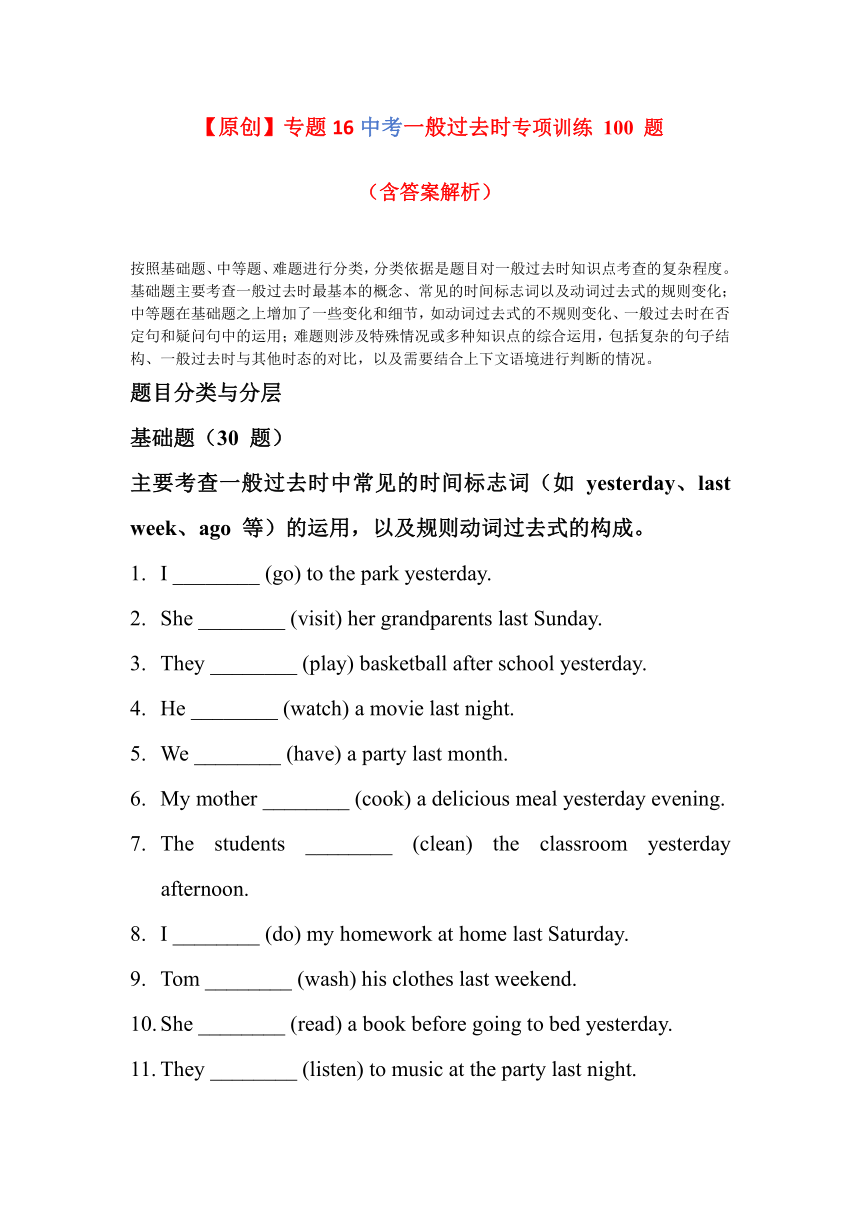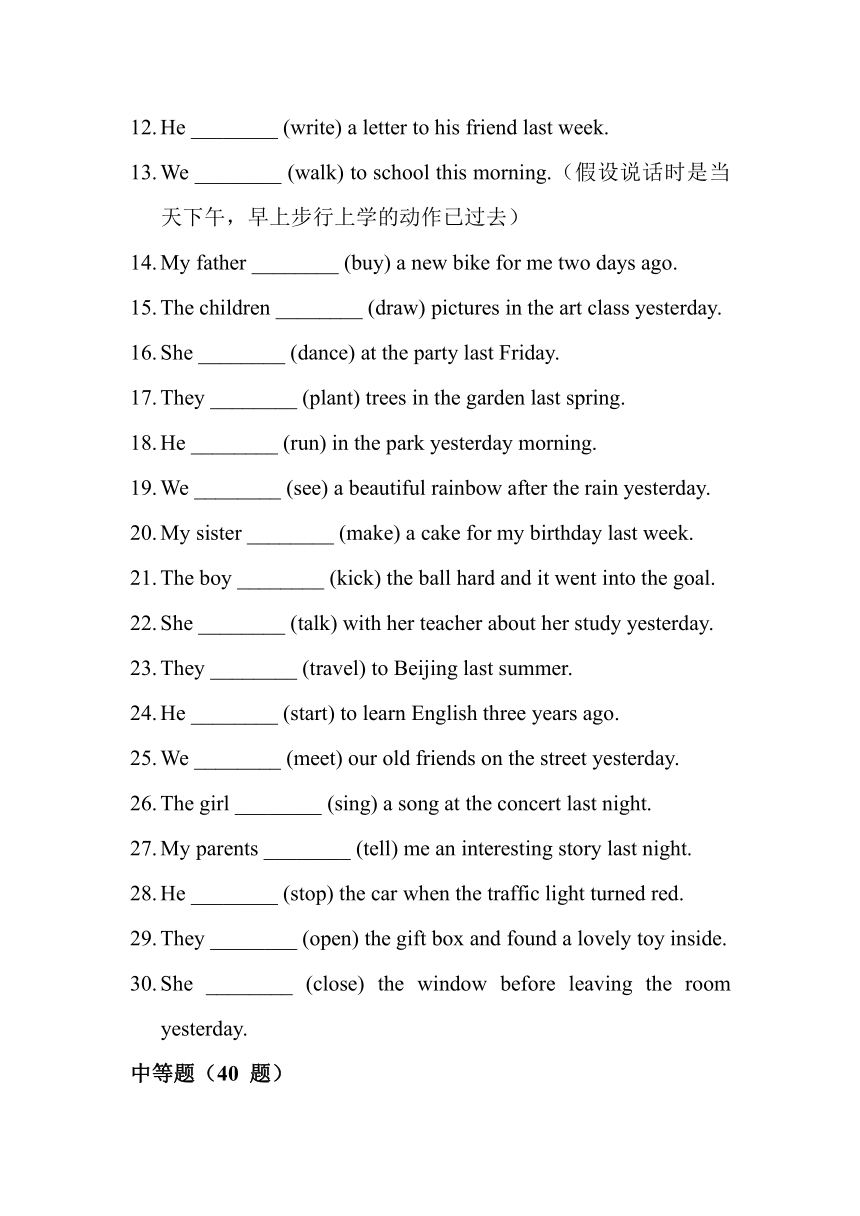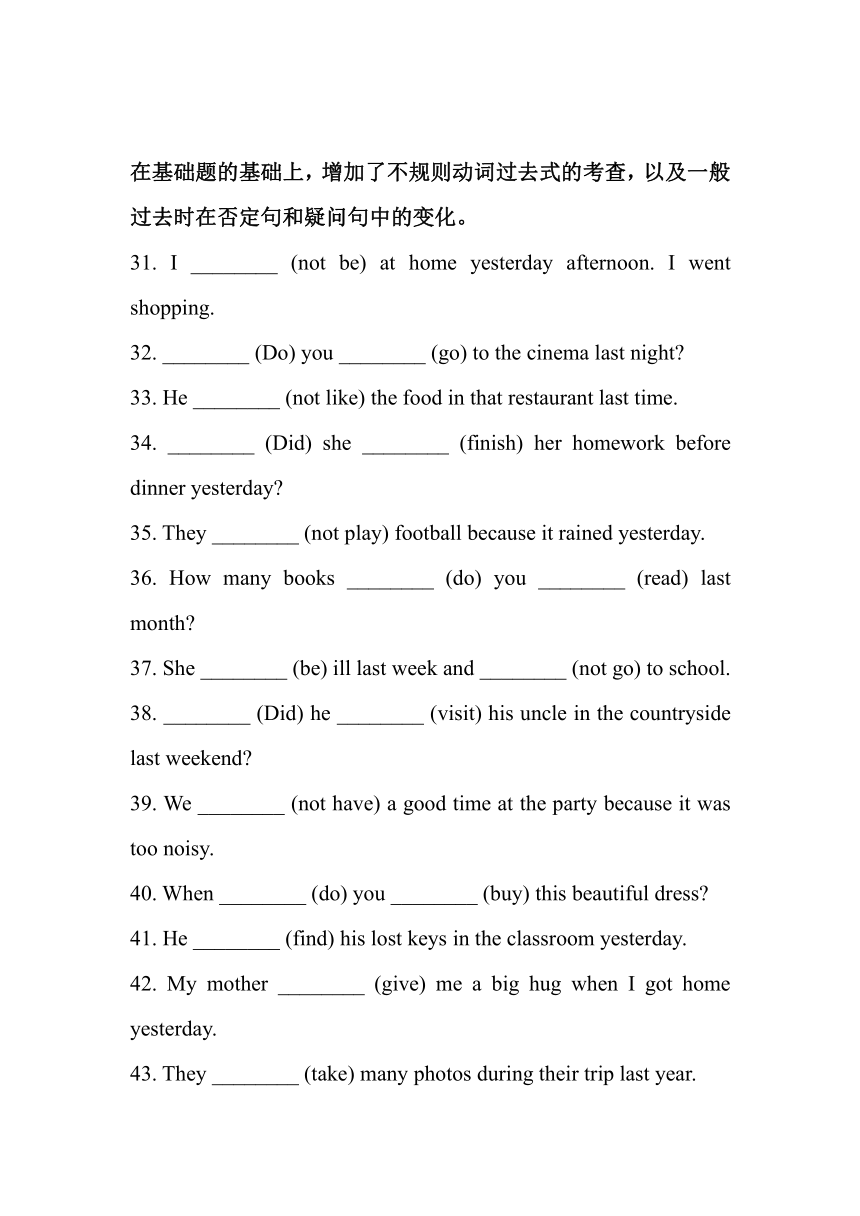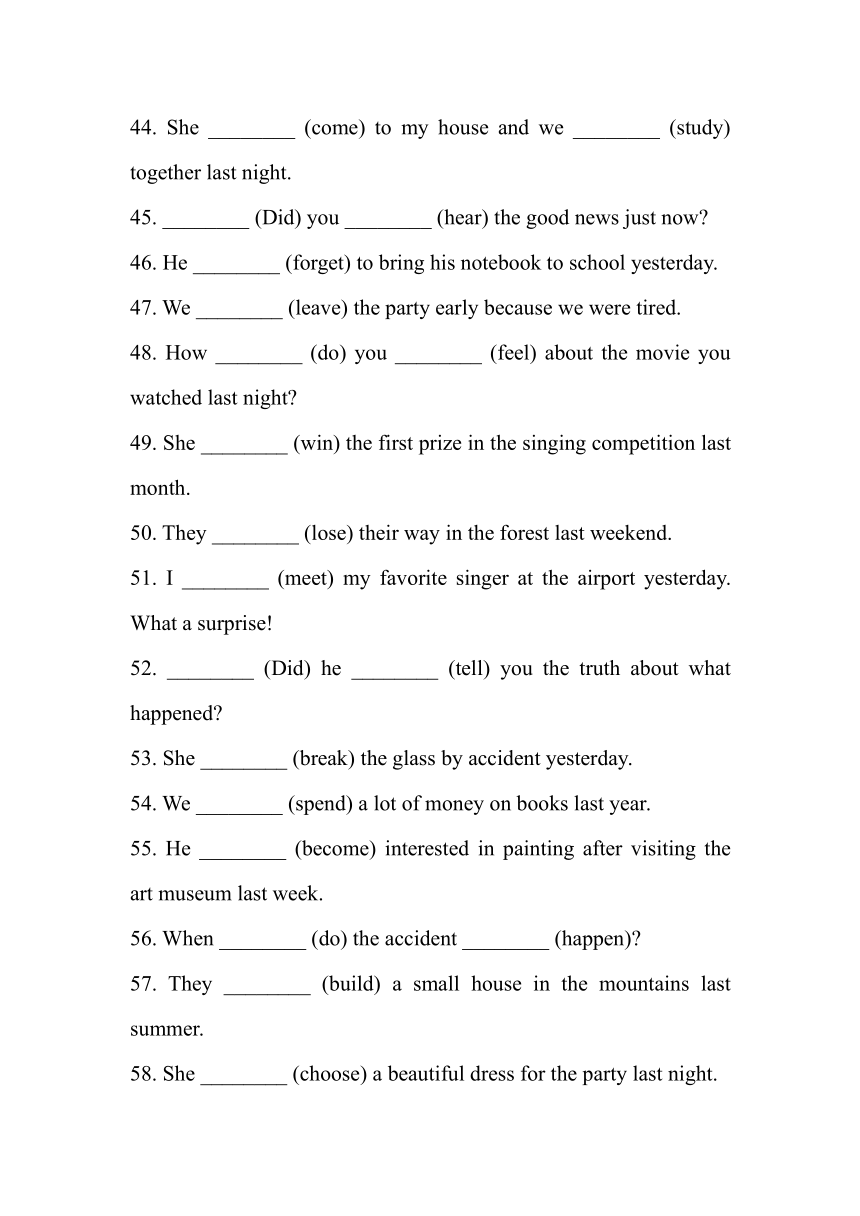【原创】专题16 一般过去时专项训练 100 题(二)-2025中考英语二轮专题复习(答题技巧+题目分类与分层)
文档属性
| 名称 | 【原创】专题16 一般过去时专项训练 100 题(二)-2025中考英语二轮专题复习(答题技巧+题目分类与分层) |  | |
| 格式 | docx | ||
| 文件大小 | 23.1KB | ||
| 资源类型 | 试卷 | ||
| 版本资源 | 人教版 | ||
| 科目 | 英语 | ||
| 更新时间 | 2025-03-01 15:31:21 | ||
图片预览





文档简介
【原创】专题16中考一般过去时专项训练 100 题
(含答案解析)
按照基础题、中等题、难题进行分类,分类依据是题目对一般过去时知识点考查的复杂程度。基础题主要考查一般过去时最基本的概念、常见的时间标志词以及动词过去式的规则变化;中等题在基础题之上增加了一些变化和细节,如动词过去式的不规则变化、一般过去时在否定句和疑问句中的运用;难题则涉及特殊情况或多种知识点的综合运用,包括复杂的句子结构、一般过去时与其他时态的对比,以及需要结合上下文语境进行判断的情况。
题目分类与分层
基础题(30 题)
主要考查一般过去时中常见的时间标志词(如 yesterday、last week、ago 等)的运用,以及规则动词过去式的构成。
I ________ (go) to the park yesterday.
She ________ (visit) her grandparents last Sunday.
They ________ (play) basketball after school yesterday.
He ________ (watch) a movie last night.
We ________ (have) a party last month.
My mother ________ (cook) a delicious meal yesterday evening.
The students ________ (clean) the classroom yesterday afternoon.
I ________ (do) my homework at home last Saturday.
Tom ________ (wash) his clothes last weekend.
She ________ (read) a book before going to bed yesterday.
They ________ (listen) to music at the party last night.
He ________ (write) a letter to his friend last week.
We ________ (walk) to school this morning.(假设说话时是当天下午,早上步行上学的动作已过去)
My father ________ (buy) a new bike for me two days ago.
The children ________ (draw) pictures in the art class yesterday.
She ________ (dance) at the party last Friday.
They ________ (plant) trees in the garden last spring.
He ________ (run) in the park yesterday morning.
We ________ (see) a beautiful rainbow after the rain yesterday.
My sister ________ (make) a cake for my birthday last week.
The boy ________ (kick) the ball hard and it went into the goal.
She ________ (talk) with her teacher about her study yesterday.
They ________ (travel) to Beijing last summer.
He ________ (start) to learn English three years ago.
We ________ (meet) our old friends on the street yesterday.
The girl ________ (sing) a song at the concert last night.
My parents ________ (tell) me an interesting story last night.
He ________ (stop) the car when the traffic light turned red.
They ________ (open) the gift box and found a lovely toy inside.
She ________ (close) the window before leaving the room yesterday.
中等题(40 题)
在基础题的基础上,增加了不规则动词过去式的考查,以及一般过去时在否定句和疑问句中的变化。
31. I ________ (not be) at home yesterday afternoon. I went shopping.
32. ________ (Do) you ________ (go) to the cinema last night
33. He ________ (not like) the food in that restaurant last time.
34. ________ (Did) she ________ (finish) her homework before dinner yesterday
35. They ________ (not play) football because it rained yesterday.
36. How many books ________ (do) you ________ (read) last month
37. She ________ (be) ill last week and ________ (not go) to school.
38. ________ (Did) he ________ (visit) his uncle in the countryside last weekend
39. We ________ (not have) a good time at the party because it was too noisy.
40. When ________ (do) you ________ (buy) this beautiful dress
41. He ________ (find) his lost keys in the classroom yesterday.
42. My mother ________ (give) me a big hug when I got home yesterday.
43. They ________ (take) many photos during their trip last year.
44. She ________ (come) to my house and we ________ (study) together last night.
45. ________ (Did) you ________ (hear) the good news just now
46. He ________ (forget) to bring his notebook to school yesterday.
47. We ________ (leave) the party early because we were tired.
48. How ________ (do) you ________ (feel) about the movie you watched last night
49. She ________ (win) the first prize in the singing competition last month.
50. They ________ (lose) their way in the forest last weekend.
51. I ________ (meet) my favorite singer at the airport yesterday. What a surprise!
52. ________ (Did) he ________ (tell) you the truth about what happened
53. She ________ (break) the glass by accident yesterday.
54. We ________ (spend) a lot of money on books last year.
55. He ________ (become) interested in painting after visiting the art museum last week.
56. When ________ (do) the accident ________ (happen)
57. They ________ (build) a small house in the mountains last summer.
58. She ________ (choose) a beautiful dress for the party last night.
59. I ________ (understand) what he said after he explained it again.
60. ________ (Did) you ________ (see) the famous actor on TV last night
61. He ________ (pay) 50 yuan for the book yesterday.
62. My parents ________ (drive) to work yesterday morning.
63. They ________ (send) a postcard to their teacher last term.
64. She ________ (grow) some flowers in her garden last spring.
65. How long ________ (do) it ________ (take) you to finish the work yesterday
66. He ________ (cut) his finger while cooking yesterday.
67. We ________ (ride) bikes around the lake last Sunday.
68. She ________ (wear) a red dress at the party last night.
69. They ________ (hear) a strange noise outside last night. What was it
70. I ________ (forget) my friend's birthday last week. I felt so bad.
难题(30 题)
这类题目难度较大,通常综合考查多个知识点,包括复杂的句子结构、一般过去时与其他时态的对比,以及需要结合上下文语境进行判断的情况。
71. By the time I ________ (arrive) at the station, the train had already left.
72. The man who ________ (save) the girl from the fire was a hero.
73. She said that she ________ (go) to the park the day before.
74. I ________ (not realize) that I had left my keys at home until I got to the door.
75. When I was walking in the street, I suddenly ________ (see) an old friend.
76. The teacher told us that the earth ________ (move) around the sun, but we learned it in a very interesting way yesterday.
77. He ________ (work) in the factory for five years before he moved to another city.
78. I thought I ________ (meet) him somewhere before, but I couldn't remember where.
79. The film ________ (begin) when we arrived at the cinema. We missed the beginning.
80. She ________ (be) ill for a week last month. But she is better now.
81. After he ________ (finish) his homework, he went out to play with his friends.
82. The boy ________ (lie) to his mother about what he did yesterday. He should tell the truth.
83. I ________ (be) about to leave when he called me.
84. The old man ________ (use) to be a teacher, but now he is retired.
85. She ________ (not know) that her mother had already bought the gift for her until she saw it.
86. When I ________ (look) through my old photos, I found a picture of my grandparents.
87. The police ________ (catch) the thief last night after a long chase.
88. I wish I ________ (can) go back to that day and change what I did.
89. He ________ (keep) the book for two weeks and then returned it to the library.
90. The children ________ (be) excited because they ________ (go) to the zoo the next day.(假设讲述过去发生的事情,第二天要去动物园)
91. She ________ (write) a letter to her pen pal every month last year. But she doesn't do that now.
92. The story he ________ (tell) us yesterday was really amazing.
93. I ________ (be) late for school this morning because I ________ (oversleep).(假设说话时是当天,早上迟到和睡过头的动作已过去)
94. The students ________ (prepare) for the exam last week. They all did well.
95. When I asked him, he ________ (admit) that he had broken the window.
96. The company ________ (offer) him a good job last year, but he refused it.
97. She ________ (practice) playing the piano for two hours every day last month.
98. The old man ________ (die) last year. He had a long and meaningful life.
99. I ________ (be) very busy last week. I had a lot of work to do.
100. They ________ (plan) to go on a trip last month, but they didn't go because of the bad weather.
答案解析
基础题答案解析
went:“yesterday” 是一般过去时的标志词,“go” 的过去式是 “went”。
visited:“last Sunday” 表明时态为一般过去时,“visit” 的过去式直接加 “ed”,即 “visited”。
played:“yesterday” 说明是过去发生的动作,“play” 的过去式为 “played”。
watched:“last night” 表示过去时间,“watch” 变为过去式 “watched”。
had:“last month” 是一般过去时的时间状语,“have” 的过去式是 “had”。
cooked:“yesterday evening” 体现过去时态,“cook” 的过去式是 “cooked”。
cleaned:“yesterday afternoon” 表明句子时态为一般过去时,“clean” 的过去式为 “cleaned”。
did:“last Saturday” 说明动作发生在过去,“do” 的过去式是 “did”。
washed:“last weekend” 表示过去,“wash” 的过去式是 “washed”。
read:“yesterday” 为过去时间,“read” 的过去式还是 “read”,但读音发生变化。
listened:“last night” 体现一般过去时,“listen” 的过去式是 “listened”。
wrote:“last week” 表明是过去的动作,“write” 的过去式是 “wrote”,属于不规则变化。
walked:假设说话时是当天下午,早上步行上学的动作已过去,“walk” 的过去式是 “walked”。
bought:“two days ago” 是一般过去时的标志,“buy” 的过去式是 “bought”。
drew:“yesterday” 说明是过去发生的事,“draw” 的过去式是 “drew”。
danced:“last Friday” 表明时态为一般过去时,“dance” 的过去式直接加 “d”,即 “danced”。
planted:“last spring” 表示过去时间,“plant” 的过去式是 “planted”。
ran:“yesterday morning” 说明动作发生在过去,“run” 的过去式是 “ran”,属于不规则变化。
saw:“yesterday” 为过去时间,“see” 的过去式是 “saw”。
made:“last week” 表明句子时态为一般过去时,“make” 的过去式是 “made”。
kicked:“kick” 的过去式是 “kicked”,句子描述过去发生的动作。
talked:“yesterday” 体现过去时态,“talk” 的过去式是 “talked”。
traveled:“last summer” 表示过去,“travel” 的过去式可以双写 “l” 加 “ed”,即 “traveled”(英式英语也可写作 travelled)。
started:“three years ago” 是一般过去时的标志,“start” 的过去式是 “started”。
met:“yesterday” 说明是过去发生的动作,“meet” 的过去式是 “met”。
sang:“last night” 表明时态为一般过去时,“sing” 的过去式是 “sang”。
told:“last night” 体现过去时态,“tell” 的过去式是 “told”。
stopped:“stop” 的过去式要双写 “p” 加 “ed”,句子描述过去的动作。
opened:“open” 的过去式是 “opened”,“found” 也表明句子是一般过去时。
closed:“yesterday” 为过去时间,“close” 的过去式是 “closed”。
中等题答案解析
wasn't:“yesterday afternoon” 表明是一般过去时,“I” 对应的 be 动词过去式是 “was”,否定形式为 “wasn't”。
Did; go:“last night” 是一般过去时的标志,一般过去时的一般疑问句要借助助动词 “did”,动词 “go” 用原形。
didn't like:“last time” 说明是过去的情况,一般过去时的否定句借助助动词 “didn't”,动词 “like” 用原形。
Did; finish:“yesterday” 表明时态为一般过去时,一般过去时的一般疑问句借助 “did”,动词 “finish” 用原形。
didn't play:“yesterday” 体现过去时态,“because” 引导的原因状语从句也表明动作发生在过去,否定句借助 “didn't”,“play” 用原形。
did; read:“last month” 是一般过去时的时间状语,特殊疑问句借助助动词 “did”,动词 “read” 用原形。
was; didn't go:“last week” 表明是过去的动作,“be ill” 表示状态,“be” 的过去式 “was”;否定句借助 “didn't”,“go” 用原形。
Did; visit:“last weekend” 是一般过去时的标志,一般过去时的一般疑问句借助 “did”,动词 “visit” 用原形。
didn't have:“at the party” 和 “was” 表明是过去的事情,否定句借助 “didn't”,“have” 用原形。
did; buy:询问过去的动作,特殊疑问句借助 “did”,动词 “buy” 用原形。
found:“yesterday” 说明动作发生在过去,“find” 的过去式是 “found”。
gave:“yesterday” 表明句子时态为一般过去时,“give” 的过去式是 “gave”。
took:“last year” 表示过去时间,“take” 的过去式是 “took”。
came; studied:“last night” 体现过去时态,“come” 的过去式是 “came”,“study” 的过去式是 “studied”。
Did; hear:“just now” 是一般过去时的标志,一般过去时的一般疑问句借助 “did”,动词 “hear” 用原形。
forgot:“yesterday” 说明是过去发生的动作,“forget” 的过去式是 “forgot”。
left:“were” 表明是过去的动作,“leave” 的过去式是 “left”。
did; feel:询问过去对电影的感受,特殊疑问句借助 “did”,动词 “feel” 用原形。
won:“last month” 表明时态为一般过去时,“win” 的过去式是 “won”。
lost:“last weekend” 是一般过去时的标志,“lose” 的过去式是 “lost”。
met:“yesterday” 说明动作发生在过去,“meet” 的过去式是 “met”。
Did; tell:一般过去时的一般疑问句借助 “did”,动词 “tell” 用原形。
broke:“yesterday” 表明句子时态为一般过去时,“break” 的过去式是 “broke”。
spent:“last year” 表示过去时间,“spend” 的过去式是 “spent”。
became:“last week” 体现过去时态,“become” 的过去式是 “became”。
did; happen:询问过去事故发生的时间,特殊疑问句借助 “did”,动词 “happen” 用原形。
built:“last summer” 是一般过去时的标志,“build” 的过去式是 “built”。
chose:“last night” 表明时态为一般过去时,“choose” 的过去式是 “chose”。
understood:“explained” 表明是过去的动作,“understand” 的过去式是 “understood”。
Did; see:“last night” 是一般过去时的标志,一般过去时的一般疑问句借助 “did”,动词 “see” 用原形。
paid:“yesterday” 说明动作发生在过去,“pay” 的过去式是 “paid”。
drove:“yesterday morning” 是过去的时间,“drive” 的过去式为 “drove”,表示 “开车” ,用于描述过去发生的动作。
sent:“last term” 表明是过去时态,“send” 的过去式是 “sent”,句子意思是他们上学期给老师寄了一张明信片。
grew:“last spring” 是一般过去时的时间标志,“grow” 的过去式为 “grew”,表示 “种植”,这里指她去年春天在花园种了些花。
did; take:“yesterday” 表示过去,该句为特殊疑问句,询问过去完成工作花费的时间,借助助动词 “did”,动词 “take” 用原形。
cut:“yesterday” 说明是过去发生的动作,“cut” 的过去式和原形同形,此处用 “cut” 表示他昨天做饭时切到了手指。
rode:“last Sunday” 体现过去时态,“ride” 的过去式是 “rode”,表示 “骑行”,即他们上周日绕湖骑自行车。
wore:“last night” 表明时态为一般过去时,“wear” 的过去式是 “wore”,表示她昨晚在派对上穿了一条红色连衣裙。
heard:“last night” 是一般过去时的标志,“hear” 的过去式是 “heard”,表示他们昨晚听到外面有奇怪的声音。
forgot:“last week” 说明是过去发生的事情,“forget” 的过去式是 “forgot”,表示 “忘记”,即我上周忘了朋友的生日。
难题答案解析
arrived:“by the time” 引导时间状语从句,从句动作发生在主句动作之前,主句用过去完成时,从句用一般过去时,“arrive” 的过去式为 “arrived” 。
saved:“who...from the fire” 是定语从句,修饰先行词 “the man”,描述过去发生的动作,“save” 的过去式是 “saved”,表示救女孩的那个男人是英雄。
had gone:“said” 是过去式,“the day before” 表示 “前一天”,“go” 这个动作发生在 “said” 之前,所以用过去完成时 “had gone”。
didn't realize:“until” 引导时间状语从句,根据 “got” 可知是过去时态,“realize” 的否定形式借助 “didn't”,用原形。表示直到到了门口我才意识到把钥匙落在家里了。
saw:“When I was walking...” 是过去进行时的时间状语从句,主句动作 “see” 在从句动作进行过程中发生,用一般过去时,“see” 的过去式是 “saw”。
moves:“地球围绕太阳转” 是客观真理,即使主句是过去时态 “told”,从句仍用一般现在时,“move” 的第三人称单数形式是 “moves” 。
had worked:“for five years” 表示一段时间,“worked” 这个动作发生在 “moved” 之前,强调过去的过去,用过去完成时 “had worked”。
had met:“thought” 是过去式,“meet” 这个动作发生在 “thought” 之前,即过去的过去,用过去完成时 “had met”,表示我觉得之前在某个地方见过他。
had begun:“arrived” 是过去式,电影开始这个动作在我们到达电影院之前就发生了,所以用过去完成时 “had begun”,我们错过了电影开头。
was:“last month” 表明是过去时态,“be ill” 表示状态,“be” 的过去式用 “was”,表示她上个月病了一周。
finished:“went” 是过去式,“finish” 的动作在 “went” 之前完成,用一般过去时,“finish” 的过去式是 “finished”,他完成作业后出去玩了。
lied:“yesterday” 说明是过去发生的动作,“lie” 表示 “说谎” 时,过去式是 “lied” ,那个男孩昨天对妈妈说谎了。
was:“be about to do sth. when...” 是固定结构,意为 “正要做某事这时……”,根据 “called” 可知是过去时态,“I” 对应的 be 动词过去式是 “was”。
used:“used to do sth.” 表示 “过去常常做某事”,固定搭配,这里指老人过去是一名老师。
didn't know:“had already bought” 是过去完成时,“know” 这个动作发生在过去,且在 “saw” 之前,用一般过去时的否定形式,借助 “didn't”,“know” 用原形。
looked:“found” 是过去式,“look through” 这个动作和 “found” 都发生在过去,“look” 的过去式是 “looked”,我翻看旧照片时发现了一张祖父母的照片。
caught:“last night” 是一般过去时的标志,“catch” 的过去式是 “caught”,警察昨晚抓住了小偷。
could:“wish” 后面的宾语从句常用虚拟语气,与过去事实相反用过去完成时,这里用 “could” 的过去式表示虚拟,我希望能回到那天改变所做的事。
kept:“for two weeks” 表示一段时间,“keep” 的过去式是 “kept”,用一般过去时表示他借那本书两周后还回了图书馆。
were; were going:讲述过去发生的事情,孩子们当时很兴奋,用 “were”;“the next day” 表示过去将来的时间,“go” 用过去进行时 “were going” 表示计划、打算去动物园 。
wrote:“last year” 表明是过去时态,“write” 的过去式是 “wrote”,她去年每月都给笔友写信。
told:“yesterday” 说明是过去发生的动作,“tell” 的过去式是 “told” ,他昨天给我们讲的故事很精彩。
was; overslept:“this morning” 是过去的时间,“be late” 用 “was late”;“oversleep” 的过去式是 “overslept”,表示我今天早上迟到是因为睡过头了。
prepared:“last week” 是一般过去时的标志,“prepare” 的过去式是 “prepared”,学生们上周为考试做准备。
admitted:“asked” 是过去式,“admit” 的过去式是 “admitted”,用一般过去时表示他承认打破了窗户。
offered:“last year” 表明是过去时态,“offer” 的过去式是 “offered”,公司去年给他提供了一份好工作。
practiced:“last month” 是一般过去时的时间标志,“practice” 的过去式是 “practiced”,她上个月每天练习弹钢琴两小时。
died:“last year” 说明是过去发生的动作,“die” 的过去式是 “died” ,老人去年去世了。
was:“last week” 表明是过去时态,“I” 对应的 be 动词过去式是 “was”,表示我上周很忙。
planned:“last month” 是一般过去时的标志,“plan” 的过去式要双写 “n” 加 “ed”,即 “planned”,他们上个月计划去旅行但没去成。
(含答案解析)
按照基础题、中等题、难题进行分类,分类依据是题目对一般过去时知识点考查的复杂程度。基础题主要考查一般过去时最基本的概念、常见的时间标志词以及动词过去式的规则变化;中等题在基础题之上增加了一些变化和细节,如动词过去式的不规则变化、一般过去时在否定句和疑问句中的运用;难题则涉及特殊情况或多种知识点的综合运用,包括复杂的句子结构、一般过去时与其他时态的对比,以及需要结合上下文语境进行判断的情况。
题目分类与分层
基础题(30 题)
主要考查一般过去时中常见的时间标志词(如 yesterday、last week、ago 等)的运用,以及规则动词过去式的构成。
I ________ (go) to the park yesterday.
She ________ (visit) her grandparents last Sunday.
They ________ (play) basketball after school yesterday.
He ________ (watch) a movie last night.
We ________ (have) a party last month.
My mother ________ (cook) a delicious meal yesterday evening.
The students ________ (clean) the classroom yesterday afternoon.
I ________ (do) my homework at home last Saturday.
Tom ________ (wash) his clothes last weekend.
She ________ (read) a book before going to bed yesterday.
They ________ (listen) to music at the party last night.
He ________ (write) a letter to his friend last week.
We ________ (walk) to school this morning.(假设说话时是当天下午,早上步行上学的动作已过去)
My father ________ (buy) a new bike for me two days ago.
The children ________ (draw) pictures in the art class yesterday.
She ________ (dance) at the party last Friday.
They ________ (plant) trees in the garden last spring.
He ________ (run) in the park yesterday morning.
We ________ (see) a beautiful rainbow after the rain yesterday.
My sister ________ (make) a cake for my birthday last week.
The boy ________ (kick) the ball hard and it went into the goal.
She ________ (talk) with her teacher about her study yesterday.
They ________ (travel) to Beijing last summer.
He ________ (start) to learn English three years ago.
We ________ (meet) our old friends on the street yesterday.
The girl ________ (sing) a song at the concert last night.
My parents ________ (tell) me an interesting story last night.
He ________ (stop) the car when the traffic light turned red.
They ________ (open) the gift box and found a lovely toy inside.
She ________ (close) the window before leaving the room yesterday.
中等题(40 题)
在基础题的基础上,增加了不规则动词过去式的考查,以及一般过去时在否定句和疑问句中的变化。
31. I ________ (not be) at home yesterday afternoon. I went shopping.
32. ________ (Do) you ________ (go) to the cinema last night
33. He ________ (not like) the food in that restaurant last time.
34. ________ (Did) she ________ (finish) her homework before dinner yesterday
35. They ________ (not play) football because it rained yesterday.
36. How many books ________ (do) you ________ (read) last month
37. She ________ (be) ill last week and ________ (not go) to school.
38. ________ (Did) he ________ (visit) his uncle in the countryside last weekend
39. We ________ (not have) a good time at the party because it was too noisy.
40. When ________ (do) you ________ (buy) this beautiful dress
41. He ________ (find) his lost keys in the classroom yesterday.
42. My mother ________ (give) me a big hug when I got home yesterday.
43. They ________ (take) many photos during their trip last year.
44. She ________ (come) to my house and we ________ (study) together last night.
45. ________ (Did) you ________ (hear) the good news just now
46. He ________ (forget) to bring his notebook to school yesterday.
47. We ________ (leave) the party early because we were tired.
48. How ________ (do) you ________ (feel) about the movie you watched last night
49. She ________ (win) the first prize in the singing competition last month.
50. They ________ (lose) their way in the forest last weekend.
51. I ________ (meet) my favorite singer at the airport yesterday. What a surprise!
52. ________ (Did) he ________ (tell) you the truth about what happened
53. She ________ (break) the glass by accident yesterday.
54. We ________ (spend) a lot of money on books last year.
55. He ________ (become) interested in painting after visiting the art museum last week.
56. When ________ (do) the accident ________ (happen)
57. They ________ (build) a small house in the mountains last summer.
58. She ________ (choose) a beautiful dress for the party last night.
59. I ________ (understand) what he said after he explained it again.
60. ________ (Did) you ________ (see) the famous actor on TV last night
61. He ________ (pay) 50 yuan for the book yesterday.
62. My parents ________ (drive) to work yesterday morning.
63. They ________ (send) a postcard to their teacher last term.
64. She ________ (grow) some flowers in her garden last spring.
65. How long ________ (do) it ________ (take) you to finish the work yesterday
66. He ________ (cut) his finger while cooking yesterday.
67. We ________ (ride) bikes around the lake last Sunday.
68. She ________ (wear) a red dress at the party last night.
69. They ________ (hear) a strange noise outside last night. What was it
70. I ________ (forget) my friend's birthday last week. I felt so bad.
难题(30 题)
这类题目难度较大,通常综合考查多个知识点,包括复杂的句子结构、一般过去时与其他时态的对比,以及需要结合上下文语境进行判断的情况。
71. By the time I ________ (arrive) at the station, the train had already left.
72. The man who ________ (save) the girl from the fire was a hero.
73. She said that she ________ (go) to the park the day before.
74. I ________ (not realize) that I had left my keys at home until I got to the door.
75. When I was walking in the street, I suddenly ________ (see) an old friend.
76. The teacher told us that the earth ________ (move) around the sun, but we learned it in a very interesting way yesterday.
77. He ________ (work) in the factory for five years before he moved to another city.
78. I thought I ________ (meet) him somewhere before, but I couldn't remember where.
79. The film ________ (begin) when we arrived at the cinema. We missed the beginning.
80. She ________ (be) ill for a week last month. But she is better now.
81. After he ________ (finish) his homework, he went out to play with his friends.
82. The boy ________ (lie) to his mother about what he did yesterday. He should tell the truth.
83. I ________ (be) about to leave when he called me.
84. The old man ________ (use) to be a teacher, but now he is retired.
85. She ________ (not know) that her mother had already bought the gift for her until she saw it.
86. When I ________ (look) through my old photos, I found a picture of my grandparents.
87. The police ________ (catch) the thief last night after a long chase.
88. I wish I ________ (can) go back to that day and change what I did.
89. He ________ (keep) the book for two weeks and then returned it to the library.
90. The children ________ (be) excited because they ________ (go) to the zoo the next day.(假设讲述过去发生的事情,第二天要去动物园)
91. She ________ (write) a letter to her pen pal every month last year. But she doesn't do that now.
92. The story he ________ (tell) us yesterday was really amazing.
93. I ________ (be) late for school this morning because I ________ (oversleep).(假设说话时是当天,早上迟到和睡过头的动作已过去)
94. The students ________ (prepare) for the exam last week. They all did well.
95. When I asked him, he ________ (admit) that he had broken the window.
96. The company ________ (offer) him a good job last year, but he refused it.
97. She ________ (practice) playing the piano for two hours every day last month.
98. The old man ________ (die) last year. He had a long and meaningful life.
99. I ________ (be) very busy last week. I had a lot of work to do.
100. They ________ (plan) to go on a trip last month, but they didn't go because of the bad weather.
答案解析
基础题答案解析
went:“yesterday” 是一般过去时的标志词,“go” 的过去式是 “went”。
visited:“last Sunday” 表明时态为一般过去时,“visit” 的过去式直接加 “ed”,即 “visited”。
played:“yesterday” 说明是过去发生的动作,“play” 的过去式为 “played”。
watched:“last night” 表示过去时间,“watch” 变为过去式 “watched”。
had:“last month” 是一般过去时的时间状语,“have” 的过去式是 “had”。
cooked:“yesterday evening” 体现过去时态,“cook” 的过去式是 “cooked”。
cleaned:“yesterday afternoon” 表明句子时态为一般过去时,“clean” 的过去式为 “cleaned”。
did:“last Saturday” 说明动作发生在过去,“do” 的过去式是 “did”。
washed:“last weekend” 表示过去,“wash” 的过去式是 “washed”。
read:“yesterday” 为过去时间,“read” 的过去式还是 “read”,但读音发生变化。
listened:“last night” 体现一般过去时,“listen” 的过去式是 “listened”。
wrote:“last week” 表明是过去的动作,“write” 的过去式是 “wrote”,属于不规则变化。
walked:假设说话时是当天下午,早上步行上学的动作已过去,“walk” 的过去式是 “walked”。
bought:“two days ago” 是一般过去时的标志,“buy” 的过去式是 “bought”。
drew:“yesterday” 说明是过去发生的事,“draw” 的过去式是 “drew”。
danced:“last Friday” 表明时态为一般过去时,“dance” 的过去式直接加 “d”,即 “danced”。
planted:“last spring” 表示过去时间,“plant” 的过去式是 “planted”。
ran:“yesterday morning” 说明动作发生在过去,“run” 的过去式是 “ran”,属于不规则变化。
saw:“yesterday” 为过去时间,“see” 的过去式是 “saw”。
made:“last week” 表明句子时态为一般过去时,“make” 的过去式是 “made”。
kicked:“kick” 的过去式是 “kicked”,句子描述过去发生的动作。
talked:“yesterday” 体现过去时态,“talk” 的过去式是 “talked”。
traveled:“last summer” 表示过去,“travel” 的过去式可以双写 “l” 加 “ed”,即 “traveled”(英式英语也可写作 travelled)。
started:“three years ago” 是一般过去时的标志,“start” 的过去式是 “started”。
met:“yesterday” 说明是过去发生的动作,“meet” 的过去式是 “met”。
sang:“last night” 表明时态为一般过去时,“sing” 的过去式是 “sang”。
told:“last night” 体现过去时态,“tell” 的过去式是 “told”。
stopped:“stop” 的过去式要双写 “p” 加 “ed”,句子描述过去的动作。
opened:“open” 的过去式是 “opened”,“found” 也表明句子是一般过去时。
closed:“yesterday” 为过去时间,“close” 的过去式是 “closed”。
中等题答案解析
wasn't:“yesterday afternoon” 表明是一般过去时,“I” 对应的 be 动词过去式是 “was”,否定形式为 “wasn't”。
Did; go:“last night” 是一般过去时的标志,一般过去时的一般疑问句要借助助动词 “did”,动词 “go” 用原形。
didn't like:“last time” 说明是过去的情况,一般过去时的否定句借助助动词 “didn't”,动词 “like” 用原形。
Did; finish:“yesterday” 表明时态为一般过去时,一般过去时的一般疑问句借助 “did”,动词 “finish” 用原形。
didn't play:“yesterday” 体现过去时态,“because” 引导的原因状语从句也表明动作发生在过去,否定句借助 “didn't”,“play” 用原形。
did; read:“last month” 是一般过去时的时间状语,特殊疑问句借助助动词 “did”,动词 “read” 用原形。
was; didn't go:“last week” 表明是过去的动作,“be ill” 表示状态,“be” 的过去式 “was”;否定句借助 “didn't”,“go” 用原形。
Did; visit:“last weekend” 是一般过去时的标志,一般过去时的一般疑问句借助 “did”,动词 “visit” 用原形。
didn't have:“at the party” 和 “was” 表明是过去的事情,否定句借助 “didn't”,“have” 用原形。
did; buy:询问过去的动作,特殊疑问句借助 “did”,动词 “buy” 用原形。
found:“yesterday” 说明动作发生在过去,“find” 的过去式是 “found”。
gave:“yesterday” 表明句子时态为一般过去时,“give” 的过去式是 “gave”。
took:“last year” 表示过去时间,“take” 的过去式是 “took”。
came; studied:“last night” 体现过去时态,“come” 的过去式是 “came”,“study” 的过去式是 “studied”。
Did; hear:“just now” 是一般过去时的标志,一般过去时的一般疑问句借助 “did”,动词 “hear” 用原形。
forgot:“yesterday” 说明是过去发生的动作,“forget” 的过去式是 “forgot”。
left:“were” 表明是过去的动作,“leave” 的过去式是 “left”。
did; feel:询问过去对电影的感受,特殊疑问句借助 “did”,动词 “feel” 用原形。
won:“last month” 表明时态为一般过去时,“win” 的过去式是 “won”。
lost:“last weekend” 是一般过去时的标志,“lose” 的过去式是 “lost”。
met:“yesterday” 说明动作发生在过去,“meet” 的过去式是 “met”。
Did; tell:一般过去时的一般疑问句借助 “did”,动词 “tell” 用原形。
broke:“yesterday” 表明句子时态为一般过去时,“break” 的过去式是 “broke”。
spent:“last year” 表示过去时间,“spend” 的过去式是 “spent”。
became:“last week” 体现过去时态,“become” 的过去式是 “became”。
did; happen:询问过去事故发生的时间,特殊疑问句借助 “did”,动词 “happen” 用原形。
built:“last summer” 是一般过去时的标志,“build” 的过去式是 “built”。
chose:“last night” 表明时态为一般过去时,“choose” 的过去式是 “chose”。
understood:“explained” 表明是过去的动作,“understand” 的过去式是 “understood”。
Did; see:“last night” 是一般过去时的标志,一般过去时的一般疑问句借助 “did”,动词 “see” 用原形。
paid:“yesterday” 说明动作发生在过去,“pay” 的过去式是 “paid”。
drove:“yesterday morning” 是过去的时间,“drive” 的过去式为 “drove”,表示 “开车” ,用于描述过去发生的动作。
sent:“last term” 表明是过去时态,“send” 的过去式是 “sent”,句子意思是他们上学期给老师寄了一张明信片。
grew:“last spring” 是一般过去时的时间标志,“grow” 的过去式为 “grew”,表示 “种植”,这里指她去年春天在花园种了些花。
did; take:“yesterday” 表示过去,该句为特殊疑问句,询问过去完成工作花费的时间,借助助动词 “did”,动词 “take” 用原形。
cut:“yesterday” 说明是过去发生的动作,“cut” 的过去式和原形同形,此处用 “cut” 表示他昨天做饭时切到了手指。
rode:“last Sunday” 体现过去时态,“ride” 的过去式是 “rode”,表示 “骑行”,即他们上周日绕湖骑自行车。
wore:“last night” 表明时态为一般过去时,“wear” 的过去式是 “wore”,表示她昨晚在派对上穿了一条红色连衣裙。
heard:“last night” 是一般过去时的标志,“hear” 的过去式是 “heard”,表示他们昨晚听到外面有奇怪的声音。
forgot:“last week” 说明是过去发生的事情,“forget” 的过去式是 “forgot”,表示 “忘记”,即我上周忘了朋友的生日。
难题答案解析
arrived:“by the time” 引导时间状语从句,从句动作发生在主句动作之前,主句用过去完成时,从句用一般过去时,“arrive” 的过去式为 “arrived” 。
saved:“who...from the fire” 是定语从句,修饰先行词 “the man”,描述过去发生的动作,“save” 的过去式是 “saved”,表示救女孩的那个男人是英雄。
had gone:“said” 是过去式,“the day before” 表示 “前一天”,“go” 这个动作发生在 “said” 之前,所以用过去完成时 “had gone”。
didn't realize:“until” 引导时间状语从句,根据 “got” 可知是过去时态,“realize” 的否定形式借助 “didn't”,用原形。表示直到到了门口我才意识到把钥匙落在家里了。
saw:“When I was walking...” 是过去进行时的时间状语从句,主句动作 “see” 在从句动作进行过程中发生,用一般过去时,“see” 的过去式是 “saw”。
moves:“地球围绕太阳转” 是客观真理,即使主句是过去时态 “told”,从句仍用一般现在时,“move” 的第三人称单数形式是 “moves” 。
had worked:“for five years” 表示一段时间,“worked” 这个动作发生在 “moved” 之前,强调过去的过去,用过去完成时 “had worked”。
had met:“thought” 是过去式,“meet” 这个动作发生在 “thought” 之前,即过去的过去,用过去完成时 “had met”,表示我觉得之前在某个地方见过他。
had begun:“arrived” 是过去式,电影开始这个动作在我们到达电影院之前就发生了,所以用过去完成时 “had begun”,我们错过了电影开头。
was:“last month” 表明是过去时态,“be ill” 表示状态,“be” 的过去式用 “was”,表示她上个月病了一周。
finished:“went” 是过去式,“finish” 的动作在 “went” 之前完成,用一般过去时,“finish” 的过去式是 “finished”,他完成作业后出去玩了。
lied:“yesterday” 说明是过去发生的动作,“lie” 表示 “说谎” 时,过去式是 “lied” ,那个男孩昨天对妈妈说谎了。
was:“be about to do sth. when...” 是固定结构,意为 “正要做某事这时……”,根据 “called” 可知是过去时态,“I” 对应的 be 动词过去式是 “was”。
used:“used to do sth.” 表示 “过去常常做某事”,固定搭配,这里指老人过去是一名老师。
didn't know:“had already bought” 是过去完成时,“know” 这个动作发生在过去,且在 “saw” 之前,用一般过去时的否定形式,借助 “didn't”,“know” 用原形。
looked:“found” 是过去式,“look through” 这个动作和 “found” 都发生在过去,“look” 的过去式是 “looked”,我翻看旧照片时发现了一张祖父母的照片。
caught:“last night” 是一般过去时的标志,“catch” 的过去式是 “caught”,警察昨晚抓住了小偷。
could:“wish” 后面的宾语从句常用虚拟语气,与过去事实相反用过去完成时,这里用 “could” 的过去式表示虚拟,我希望能回到那天改变所做的事。
kept:“for two weeks” 表示一段时间,“keep” 的过去式是 “kept”,用一般过去时表示他借那本书两周后还回了图书馆。
were; were going:讲述过去发生的事情,孩子们当时很兴奋,用 “were”;“the next day” 表示过去将来的时间,“go” 用过去进行时 “were going” 表示计划、打算去动物园 。
wrote:“last year” 表明是过去时态,“write” 的过去式是 “wrote”,她去年每月都给笔友写信。
told:“yesterday” 说明是过去发生的动作,“tell” 的过去式是 “told” ,他昨天给我们讲的故事很精彩。
was; overslept:“this morning” 是过去的时间,“be late” 用 “was late”;“oversleep” 的过去式是 “overslept”,表示我今天早上迟到是因为睡过头了。
prepared:“last week” 是一般过去时的标志,“prepare” 的过去式是 “prepared”,学生们上周为考试做准备。
admitted:“asked” 是过去式,“admit” 的过去式是 “admitted”,用一般过去时表示他承认打破了窗户。
offered:“last year” 表明是过去时态,“offer” 的过去式是 “offered”,公司去年给他提供了一份好工作。
practiced:“last month” 是一般过去时的时间标志,“practice” 的过去式是 “practiced”,她上个月每天练习弹钢琴两小时。
died:“last year” 说明是过去发生的动作,“die” 的过去式是 “died” ,老人去年去世了。
was:“last week” 表明是过去时态,“I” 对应的 be 动词过去式是 “was”,表示我上周很忙。
planned:“last month” 是一般过去时的标志,“plan” 的过去式要双写 “n” 加 “ed”,即 “planned”,他们上个月计划去旅行但没去成。
同课章节目录
- 词法
- 名词
- 动词和动词短语
- 动词语态
- 动词时态
- 助动词和情态动词
- 非谓语动词
- 冠词
- 代词
- 数词和量词
- 形容词副词及其比较等级
- 介词和介词短语
- 连词和感叹词
- 构词法
- 相似、相近词比较
- 句法
- 陈述句
- 一般疑问句和否定疑问句
- 特殊疑问句及选择疑问句
- 反意疑问句
- 存在句(There be句型)
- 宾语从句
- 定语从句
- 状语从句
- 主谓一致问题
- 简单句
- 并列句
- 复合句
- 主谓一致
- 主、表语从句
- 名词性从句
- 直接引语和间接引语
- 虚拟语气
- 感叹句
- 强调句
- 倒装句
- 祈使句
- 句子的成分
- 句子的分类
- 题型专区
- 单项选择部分
- 易错题
- 完形填空
- 阅读理解
- 词汇练习
- 听说训练
- 句型转换
- 补全对话
- 短文改错
- 翻译
- 书面表达
- 任务型阅读
- 语法填空
- 其他资料
